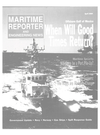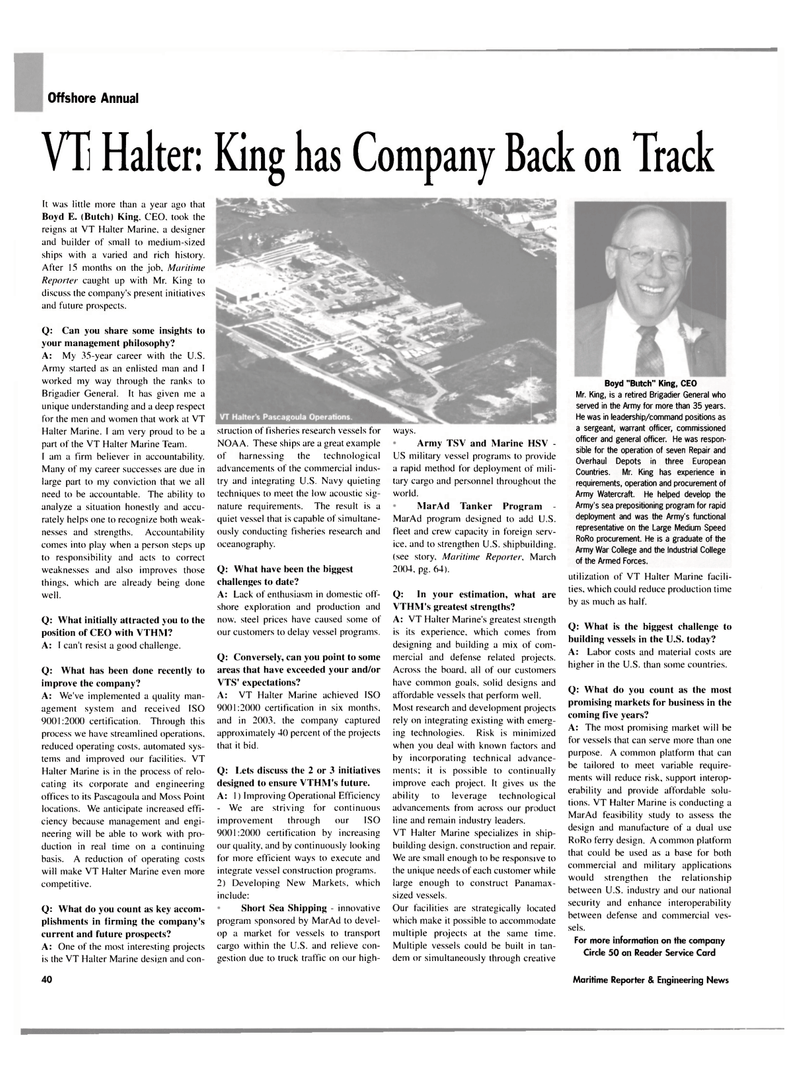
Page 42: of Maritime Reporter Magazine (April 2004)
Offshore Technology Yearbook
Read this page in Pdf, Flash or Html5 edition of April 2004 Maritime Reporter Magazine
Offshore Annual
VT Halter: King has Company Back on Track
It was little more than a year ago that
Boyd E. (Butch) King. CEO. took the reigns at VT Halter Marine, a designer and builder of small to medium-sized ships with a varied and rich history.
After 15 months on the job, Maritime
Reporter caught up with Mr. King to discuss the company's present initiatives and future prospects.
Q: Can you share some insights to your management philosophy?
A: My 35-year career with the U.S.
Army started as an enlisted man and I worked my way through the ranks to
Brigadier General. It has given me a unique understanding and a deep respect for the men and women that work at VT
Halter Marine. I am very proud to be a part of the VT Halter Marine Team.
I am a firm believer in accountability.
Many of my career successes are due in large part to my conviction that we all need to be accountable. The ability to analyze a situation honestly and accu- rately helps one to recognize both weak- nesses and strengths. Accountability comes into play when a person steps up to responsibility and acts to correct weaknesses and also improves those things, which are already being done well.
Q: What initially attracted you to the position of CEO with VTHM?
A: I can't resist a good challenge.
Q: What has been done recently to improve the company?
A: We've implemented a quality man- agement system and received ISO 9001:2000 certification. Through this process we have streamlined operations, reduced operating costs, automated sys- tems and improved our facilities. VT
Halter Marine is in the process of relo- cating its corporate and engineering offices to its Pascagoula and Moss Point locations. We anticipate increased effi- ciency because management and engi- neering will be able to work with pro- duction in real time on a continuing basis. A reduction of operating costs will make VT Halter Marine even more competitive.
Q: What do you count as key accom- plishments in firming the company's current and future prospects?
A: One of the most interesting projects is the VT Halter Marine design and con- struction of fisheries research vessels for
NOAA. These ships are a great example of harnessing the technological advancements of the commercial indus- try and integrating U.S. Navy quieting techniques to meet the low acoustic sig- nature requirements. The result is a quiet vessel that is capable of simultane- ously conducting fisheries research and oceanography.
Q: What have been the biggest challenges to date?
A: Lack of enthusiasm in domestic off- shore exploration and production and now, steel prices have caused some of our customers to delay vessel programs.
Q: Conversely, can you point to some areas that have exceeded your and/or
VTS' expectations?
A: VT Halter Marine achieved ISO 9001:2000 certification in six months, and in 2003, the company captured approximately 40 percent of the projects that it bid.
Q: Lets discuss the 2 or 3 initiatives designed to ensure VTHM's future.
A: 1) Improving Operational Efficiency - We are striving for continuous improvement through our ISO 9001:2000 certification by increasing our quality, and by continuously looking for more efficient ways to execute and integrate vessel construction programs. 2) Developing New Markets, which include:
Short Sea Shipping - innovative program sponsored by MarAd to devel- op a market for vessels to transport cargo within the U.S. and relieve con- gestion due to truck traffic on our high- ways.
Army TSV and Marine HSV -
US military vessel programs to provide a rapid method for deployment of mili- tary cargo and personnel throughout the world.
MarAd Tanker Program -
MarAd program designed to add U.S. fleet and crew capacity in foreign serv- ice. and to strengthen U.S. shipbuilding, (see story. Maritime Reporter, March 2004, pg. 64).
Q: In your estimation, what are
VTHM's greatest strengths?
A: VT Halter Marine's greatest strength is its experience, which comes from designing and building a mix of com- mercial and defense related projects.
Across the board, all of our customers have common goals, solid designs and affordable vessels that perform well.
Most research and development projects rely on integrating existing with emerg- ing technologies. Risk is minimized when you deal with known factors and by incorporating technical advance- ments; it is possible to continually improve each project. It gives us the ability to leverage technological advancements from across our product line and remain industry leaders.
VT Halter Marine specializes in ship- building design, construction and repair.
We are small enough to be responsive to the unique needs of each customer while large enough to construct Panamax- sized vessels.
Our facilities are strategically located which make it possible to accommodate multiple projects at the same time.
Multiple vessels could be built in tan- dem or simultaneously through creative
Boyd "Butch" King, CEO
Mr. King, is a retired Brigadier General who served in the Army for more than 35 years.
He was in leadership/command positions as a sergeant, warrant officer, commissioned officer and general officer. He was respon- sible for the operation of seven Repair and
Overhaul Depots in three European
Countries. Mr. King has experience in requirements, operation and procurement of
Army Watercraft. He helped develop the
Army's sea prepositioning program for rapid deployment and was the Army's functional representative on the Large Medium Speed
RoRo procurement. He is a graduate of the
Army War College and the Industrial College of the Armed Forces. utilization of VT Halter Marine facili- ties, which could reduce production time by as much as half.
Q: What is the biggest challenge to building vessels in the U.S. today?
A: Labor costs and material costs are higher in the U.S. than some countries.
Q: What do you count as the most promising markets for business in the coming five years?
A: The most promising market will be for vessels that can serve more than one purpose. A common platform that can be tailored to meet variable require- ments will reduce risk, support interop- erability and provide affordable solu- tions. VT Halter Marine is conducting a
MarAd feasibility study to assess the design and manufacture of a dual use
RoRo ferry design. A common platform that could be used as a base for both commercial and military applications would strengthen the relationship between U.S. industry and our national security and enhance interoperability between defense and commercial ves- sels.
For more information on the company
Circle 50 on Reader Service Card 40 Maritime Reporter & Engineering News

 41
41

 43
43
